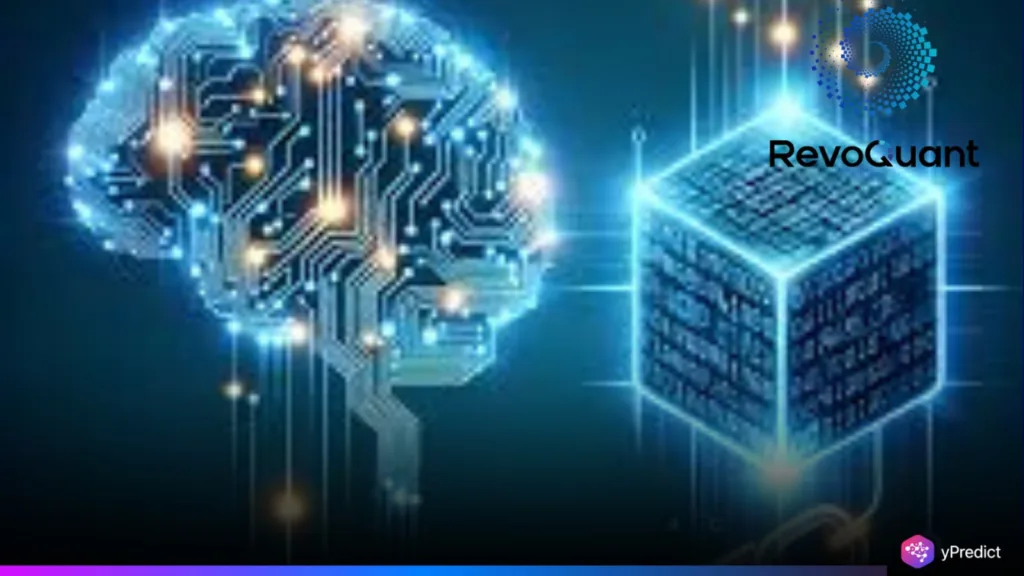
RevoQuant blends quantum-inspired AI with blockchain to address automation, data integrity, and security in decentralized systems. Its AI-enhanced oracles aim to reduce latency and inaccuracy, offering a potential upgrade over current standards. Tools like Task Scheduler and Anomaly Detection reflect a push toward intelligent automation and adaptive protection. The $REQT token introduces a revenue-sharing model tied to AI performance and community engagement. Nevertheless, RevoQuant shows an interesting change in the way AI can develop in the context of decentralized environments, and this is also likely to be the trend related to intelligent self-regulating blockchain architecture.
Quantum-Inspired AI and Intelligent Oracles
RevoQuant’s primary AI innovation lies in its use of quantum-inspired design, drawing concepts from quantum computing like superposition and entanglement without requiring quantum hardware. This design informs its AI’s approach to handling oracle data in blockchain systems, a long-standing vulnerability due to issues with latency, manipulation, and verification. By applying quantum-inspired models, RevoQuant’s AI agents attempt to dynamically verify and adjust real-time data streams feeding into decentralized applications (dApps). This can theoretically improve responsiveness and accuracy across finance, gaming, and logistics platforms reliant on external data.
This approach positions AI as more than a passive analytics engine. It becomes an active arbitrator of trust and precision, aligning with a larger shift in AI’s role, from prediction to control. Unlike static oracles, RevoQuant’s are designed to adapt based on context, improving over time through reinforcement learning and pattern recognition.
However, the true test lies in scale and consistency. While traditional AI has shown efficacy in narrow contexts, applying quantum-inspired principles remains largely experimental. RevoQuant thus serves as a testbed for AI architectures capable of greater adaptability and data intelligence. If successful, it could lead to AI systems that are not only predictive but self-validating, an evolutionary step in AI’s functional autonomy.
Automating Trust – AI in Security and Interoperability
RevoQuant uses AI to automate traditionally manual blockchain operations, including task scheduling, data analysis, and network diagnostics. The developers designed the Task Scheduler to eliminate the human bottlenecks by controlling the behavior of Oracle nodes, fine-tuning performance to workload and network requirements. Taken together with the Data Analyzer, which leverages predictive analytics on top of multiple chains, these tools will lead to full-scale autonomous blockchain infrastructure serving as a revision of the overall vision in AI to control complex systems with limited supervision.
Security is a critical area where AI shows potential. RevoQuant’s Anomaly Detection module is built on adaptive algorithms capable of recognizing subtle deviations in node behavior, signaling potential breaches or faulty inputs before they propagate. This proactive model reflects a broader shift in AI’s security role, from static gatekeeping to continuous threat interpretation. The system’s feedback loop allows for on-the-fly recalibration, meaning AI isn’t just protecting data but shaping how the network reacts to threats.
RevoQuant shows AI researchers and developers how they can use decentralized, data-rich environments to test adaptive security systems and predictive maintenance models. If these systems prove resilient, the blockchain industry could become a proving ground for generalized AI agents that manage infrastructure, not just interpret data, advancing the vision of intelligent autonomous networks.
AI’s Future in Decentralized Systems
RevoQuant highlights how decentralized AI could evolve from task automation into system-wide orchestration. Its quantum-inspired architecture, if validated, suggests AI models can become agents of real-time decision-making, not just passive analysts. The platform positions AI as the core layer in blockchain coordination, handling trust, threat response, and task optimization autonomously. If successful, this model could be adopted across decentralized finance, logistics, and identity management. For the AI sphere, RevoQuant offers a new direction: intelligent agents trained not just to think but to act, govern, and adapt in complex environments. It’s a potential step toward AI systems that operate as infrastructure itself.






